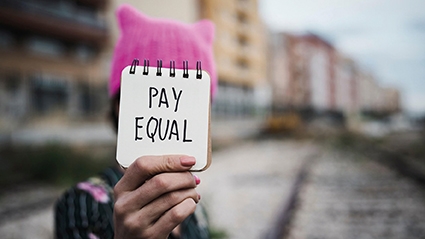Georgian Women Mark Equal Pay Day
It is Equal Pay Day. That is not something to celebrate. This is the slogan of the Georgian Women’s Movement which marked Equal Pay Day on August 23 to highlight the difference between men's and women's salaries, which in Georgia is 36%.
The organization says studies show that high wage differences directly increase the number of economically inactive women.
“The wage gap also has a bad impact on child poverty - the poorer the mother, the more difficult the life her child has. The pay gap makes women economically dependent on the family, which in turn increases the risk of violence against women,” the statement released by the organization reads.
The Georgian Women’s Movement says the salary difference has many causes, among them:
• Wage discrimination on the basis of gender in the workplace;
• The burden of unpaid domestic labor;
• "Glass ceiling", i.e. invisible barriers to promotion;
• Dividing jobs into female and male sectors.
The organization also says that according to the National Statistics Office (Geostat), 42% of women are economically inactive.
“The high level of economically inactive women is unjustified in the context of poverty in the country. The government must ensure a non-discriminatory wage and labor conditions that will empower women and boost the country's economy. The best experience of foreign countries shows that the pay gap can be overcome through specific reforms,” the statement reads.
In addition to prohibiting pay discrimination, signatory organizations call on the authorities to:
• Prohibit wage discrimination under the Labor Code;
• Develop an anti-pay gap action plan that sets out mechanisms to combat differences in wages;
• Attract investments and invest in social infrastructure that will help redistribute women's domestic burdens and create additional jobs;
• Develop vocational training programs tailored to housewives and economically inactive women;
• Minister of Economy Natia Turnava should take responsibility to develop and introduce a strategy for the economic empowerment of women.
The Public Defender of Georgia, Nino Lomjaria, also got involved in the campaign. According to the Ombudsman, ensuring gender equality in labor relations and the economic empowerment of women remains a challenge in Georgia, which in turn has a negative impact on women's legal status, including increasing their vulnerability to discrimination and domestic violence.
Lomjaria stressed the gender pay gap negatively impacts the general state of women's equality and forms the basis for discriminatory restriction of certain basic rights. She adds that there are still stereotypes in Georgia that define gender barriers to women's participation in social life. She also claims that the existence of barriers regarding women’s financial income may in some cases lead to social marginalization of certain groups of women.
“The economic situation of women is significantly linked to domestic violence, as one of the obstacles to escaping domestic violence is the financial dependence on the abuser or his family. Despite this problem, there is still no methodology in Georgia for determining equal value labor, which subsequently impedes accurate payroll data and planning of appropriate measures, the Ombudsman stressed, adding the measures taken by the state in terms of the economic empowerment of women and improvement of labor rights are insufficient.
The Public Defender of Georgia calls on the relevant government agencies to be actively involved in addressing gender pay gap issues, and to plan effective measures to reduce the current imbalance and increase women's economic participation.
The National Statistics Office of Georgia said the gender pay gap in Georgia is quite high at 36%. However, according to the 2018 Global Gender Inequality Index, Georgia has moved from 69th out of 149 countries to 45th in terms of equal pay.
According to the average gender income, the estimated annual income of a man in Georgia is twice that of a woman and in terms of participation in unpaid family work, the contribution of women is almost twice that of men’s.
By Thea Morrison
Image source: Teen Vogue











